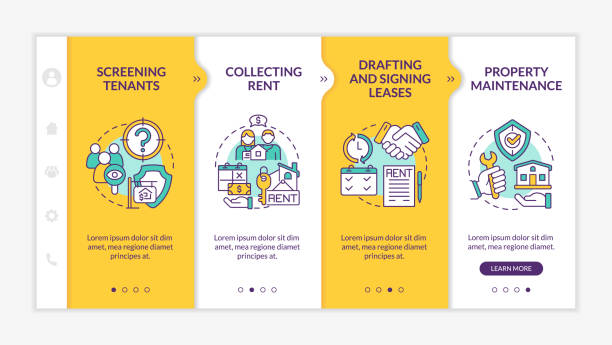You need to have good strategies for dealing with difficult tenants and conflict resolution as a landlord. Conflict arises not from good or bad, but from differences. All human beings are different mainly because of their thought patterns and how they perceive things. You can't say you will never have conflicts because these differences are what cause these conflicts.
As a house owner, you should have a good strategy for handling these issues when they arise. This can help you keep a pleasant and profitable rental business. This article will discuss how to handle difficult tenants and conflicts successfully.
1. Set Clear Expectations from the Start
The first strategy for handling difficult tenants and conflict resolution is setting up clear expectations. To prevent potential conflicts, you must clearly state what your tenants expect. You should also make sure to spell this out right from the beginning. This includes;
- Provide a detailed lease agreement outlining both parties' rules, regulations, and responsibilities.
- By ensuring that tenants understand their obligations and the consequences of violating the agreement. When you do this, you can mitigate potential issues.
- You can also consider producing a Tenant Handbook
(Key Strategies for Accidental Landlords to Succeed)
2. Conduct a thorough Screening Before Admitting Tenants
This is where the first mistake comes. When your tenant does not want peace, it will be hard to make peace with that tenant. You must make sure to admit a tenant who can give you peace in the first place. Make sure to do these 3 things;
- Credit Check: Make sure the tenant is the kind of person who pays his or her debt.
- Background check: Check with their previous landlords to understand the kind of person they are. Learn if they were good tenant or a bad tenant. Also, make sure they are consistent with their rent payment.
- Criminal Check: Carry out a proper criminal check on the potential tenant. Also, ensure you do it within the law.
3. Effective Communication
Open and effective communication Channel. Open communication is key to resolving conflicts and maintaining a positive landlord-tenant relationship. Encourage your tenants to share any concerns or issues they may have on time.
Actively listen to their grievances and address them on time. When you respond to tenant queries promptly in time, it shows your commitment to their satisfaction. Some of the common communication gaps we have noticed over time include;
- Lack of clear documents stating every payment the tenant is to make.
- Late memo before inspection or maintenance check.
- A lack of proper feedback channels.
(10 Strategies to Encourage Your Tenants to Renew Their Rent and Stay Longer)
4. Practice Empathy and Understanding
Difficult tenants may be facing personal or financial challenges. This can contribute to their behavior. Approach these situations with empathy and understanding. Show compassion and try to understand their point of view.
With this, you can create a good rapport and likely reduce the chance of conflicts.
5. Document Everything
In challenging cases, keeping accurate documentation is crucial. Keep records of all forms of communication like emails, letters, and phone calls. These records can serve as evidence in case of legal disputes and help you protect your interests.
(The Benefits of Using Property Management Software)
6. Be Respectful and Professional

Treat your tenants with respect. When they see that you respect them, they reciprocate it most of the time. Whenever you are handling any issues with them, show a high level of professionalism. When you act this way, you command their respect.
Tenants will always respect a landlord who respects them and shows a high level of professionalism. When your tenants respect you, they are less likely to have issues with you. We know this by experience.
(How to Find the Right Tenants for Your Rental Property)
7. Enforce Lease Terms Fairly
The area of rent is one place to pay close attention to when handling difficult tenants and conflicts. Ensure that your lease terms are fair and consistent. Consistency is vital when enforcing lease terms. Treat all tenants fairly and apply rules and consequences uniformly.
This approach creates a sense of fairness and prevents tenants from engaging in disruptive actions.
8. Seek Mediation
Seek mediation where a conflict escalates and proves difficult to resolve by yourself. Bring in a neutral third party who can help foster a constructive dialogue between you and your tenant. This alternative method can cut down costs and lead to mutually acceptable outcomes.
9. Consult Legal Professionals
In some cases, conflicts become legally complex or require expert guidance. Consult a legal person specialized in landlord-tenant matters. Such a person can provide you with accurate legal advice. They can also ensure compliance with local laws and represent your interests effectively.
(15 Legal Considerations For Property Managers)
10. Offer Incentives for Cooperation
In some situations, providing incentives to difficult tenants can be an effective strategy. Offer concessions or rewards for positive changes in behavior or adherence to lease terms. This approach can motivate tenants to improve their conduct and foster a more positive and cooperative rental environment.
11. Maintain Property and Promptly Address Maintenance Issues
Ensure regular inspection and fix property damages promptly. This will help prevent conflicts with tenants. Also, address concerns related to safety and comfort. Doing this shows your commitment to their well-being, making it less likely for disputes to arise.
(Importance of Regular Property Maintenance and Inspections)
Conclusion
In conclusion, handling difficult tenants and conflict resolution requires a combination of efforts. These efforts will prove to your tenant that you have their interest at heart even as you are concerned for your property. If they feel this way, it can help reduce conflicts. This knowledge will also help you resolve issues promptly when they arise.
We have had our share of dealing with difficult tenants and conflict resolution. One of the things we came to realize after a while was that most of these tenants did not mean to be difficult. Sometimes, it can be an issue with the tone or loudness of their voice. Other times it can be because of their professional training.
However, one thing that has been the most common cause has been bad experiences with their previous landlords. This shaped their opinion and gave them a negative perception of property owners.
In a nutshell, only a small fraction of tenants are difficult or love conflicts. If you have a challenge with your rental properties or implementing this strategy, we invite you to reach out to us. Stutts Properties is a property management company with over 2 decades of experience in the industry. Let us help you too.
Also, read;
Learn How to Create and Manage Rent Roll
Comprehensive Guide on How to Choose the Right Insurance Coverage
How to Finding the Best Property Management Company
Rental Property KPIs and Why You Must Track Them
Short-Term Rentals and Month-to-Month Lease Agreements
Tenants Rights in Alabama You Should Know


